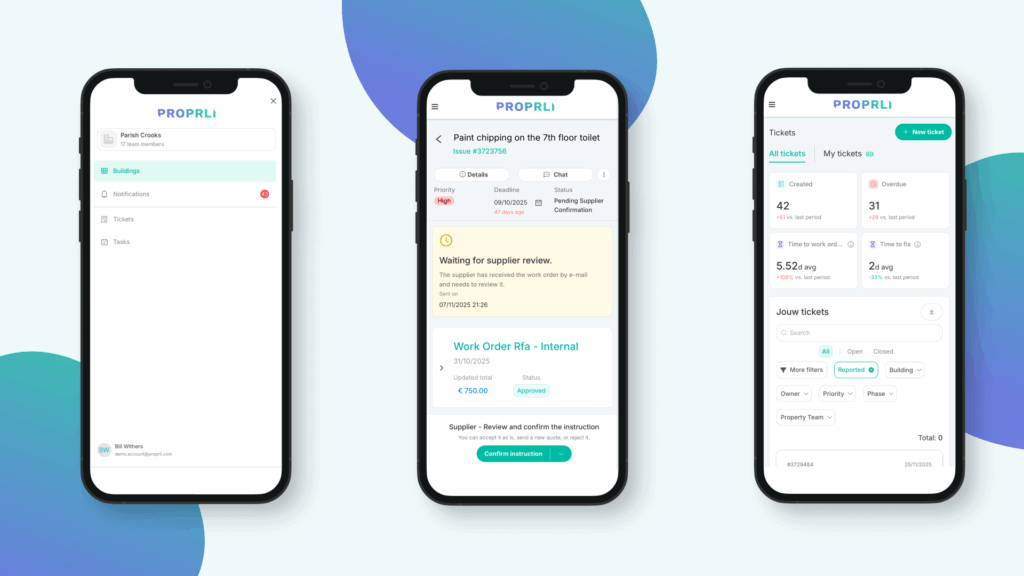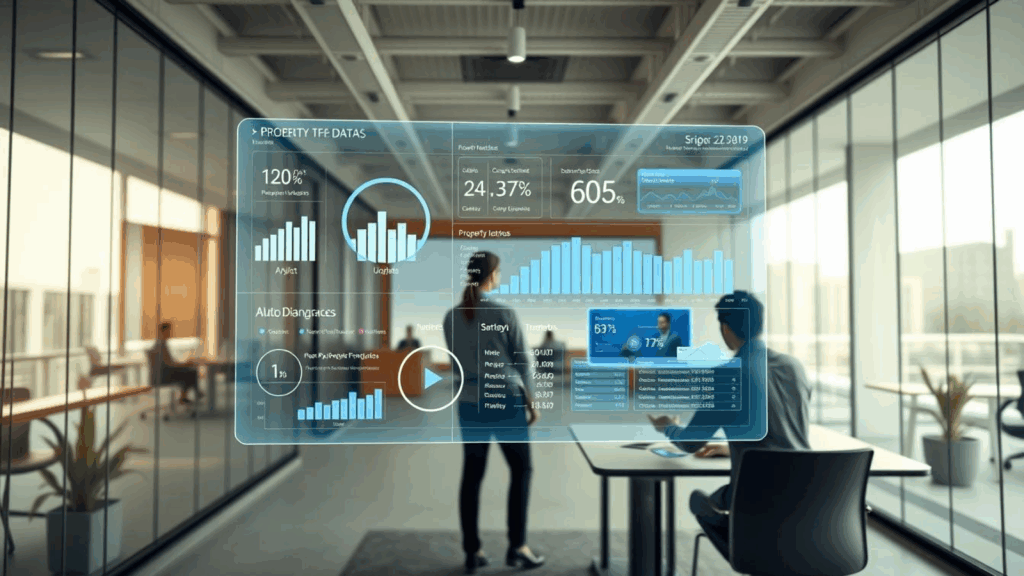The real estate sector is undergoing a profound transformation, driven by the rapid integration of innovative technologies. Looking ahead to 2025, the proptech landscape appears promising, with several emerging trends poised to redefine commercial real estate. Technologies like Artificial Intelligence (AI), Big Data, Virtual Reality (VR), and the Internet of Things (IoT) are set to revolutionize operations. They promise to enhance efficiency and unlock new avenues for growth.
The global real estate market is forecasted to experience significant expansion, with a projected Compound Annual Growth Rate (CAGR) of 5.00% from 2024 to 2032. This growth is largely driven by an increasing population and a heightened demand for superior housing and infrastructure. As the industry continues to evolve, it’s essential for real estate professionals to stay abreast of the latest property technology news and insights.
Key Takeaways
- Proptech is transforming the commercial real estate industry, with AI, Big Data, VR, and IoT leading the charge
- The global real estate market is projected to grow at a CAGR of 5.00% between 2024 and 2032
- Staying informed about the latest proptech trends and innovations is crucial for real estate professionals
- Proptech solutions are streamlining operations, improving efficiency, and creating new growth opportunities
The Evolution of Proptech in Commercial Real Estate
The commercial real estate sector has undergone a significant transformation, driven by the rapid adoption of proptech solutions. Proptech, short for property technology, includes innovative tools and platforms. These tools streamline processes, enhance efficiency, and unlock new opportunities in real estate. The proptech evolution is reshaping how professionals operate and interact with properties and clients.
The digital transformation in real estate is fueled by the demand for efficient, data-driven, and user-friendly solutions. Property owners, managers, and investors are embracing technology in the real estate industry to optimize operations and improve tenant experiences. Proptech solutions, from virtual tours to smart building management systems, are revolutionizing commercial real estate.
The proptech market growth is driven by the need for transparency and data accessibility. Proptech platforms help real estate professionals analyze vast amounts of data. This data-driven approach leads to more accurate valuations, targeted marketing, and personalized tenant experiences, increasing efficiency and profitability.
Smart building technologies are another key aspect of the proptech evolution. Internet of Things (IoT) devices, sensors, and automation systems are being integrated into commercial properties. These solutions optimize energy consumption, enhance security, and improve building performance. They reduce operational costs and contribute to sustainable, environmentally friendly buildings.
As the commercial real estate industry continues to embrace digital transformation, proptech adoption is expected to accelerate. Real estate professionals who adapt to this technological shift will be well-positioned to stay competitive. They will attract and retain tenants and maximize property value in the evolving market landscape.
Real Estate Industry Overview and Predictions
The real estate industry is a cornerstone of the global economy, with commercial assets valued at nearly USD 9 trillion. When combined with residential real estate, it’s evident that real estate is the world’s largest asset class. It has generated significant wealth and investment opportunities over the years.
In 2018, real estate investment peaked at USD 311 billion, as reported by CBRE. This highlights the industry’s strength and potential. The global real estate market is expected to grow at a 5.00% compound annual growth rate (CAGR) from 2024 to 2032. This growth is driven by population increase and demand for quality housing and infrastructure.
Several trends and predictions are shaping the future of the real estate industry:
- Increased adoption of technology, such as proptech solutions, to enhance efficiency and transparency
- Growing focus on sustainability and green building practices to reduce environmental impact
- Shifting consumer preferences towards flexible and multi-functional spaces
- Rise of alternative asset classes, such as student housing and senior living facilities
- Continued urbanization and the development of smart cities
The following table highlights the projected growth of the global real estate market across various sectors:
| Sector | Projected CAGR (2024-2032) |
|---|---|
| Residential | 5.2% |
| Commercial | 4.7% |
| Industrial | 5.5% |
| Retail | 4.2% |
The real estate industry is set for continued growth and transformation in the coming years. Real estate market predictions suggest that investors and industry professionals who stay attuned to these trends will be well-positioned. They will be able to capitalize on the vast opportunities presented by this dynamic and evolving market.
Key Proptech Trends Shaping the Future of Commercial Real Estate
The real estate sector is undergoing a profound digital transformation, driven by proptech innovations. These advancements are reshaping the management, transaction, and experience of properties. Technologies like artificial intelligence (AI), the Internet of Things (IoT), blockchain, virtual and augmented reality, and big data analytics are at the forefront.
AI and machine learning are significantly impacting real estate software and platforms. AI tools enhance property valuations, predictive maintenance, and tenant experiences. For example, AI chatbots help with inquiries, while intelligent systems optimize energy and comfort.
The IoT is revolutionizing commercial real estate. Smart sensors and devices enable real-time monitoring and control of building systems. This leads to better efficiency, cost savings, and sustainability. IoT also provides valuable data for decision-making and asset optimization.
Blockchain technology is transforming the real estate industry. It promises to streamline transactions, enhance security, and increase transparency. Blockchain-based platforms securely store and share property data, execute smart contracts, and enable fractional ownership. This innovation could reduce fraud, lower costs, and attract more investors.
Virtual and augmented reality are changing property marketing and experience. Immersive virtual tours and interactive augmented reality overlays enhance decision-making. These technologies save time and resources, offering engaging experiences for clients.
Big data analytics is another crucial trend in commercial real estate. It leverages vast data to provide insights and inform decisions. Predictive analytics help identify risks, optimize performance, and uncover growth opportunities.
As these trends evolve, the commercial real estate industry is set for a major transformation. Embracing these innovations is essential for staying competitive and delivering exceptional experiences. The future of commercial real estate is deeply connected with proptech advancements. Those who adapt and leverage these trends will thrive in the coming years.
Artificial Intelligence (AI) in Real Estate
Artificial Intelligence (AI) is transforming the real estate industry, changing how properties are managed, valued, and sold. AI tools are now common, offering many applications that make processes smoother and decisions better. From property valuation to virtual assistants, AI is reshaping the real estate world.
Automated property valuation is a major AI application in real estate. AI algorithms use data on market trends, comparable properties, and sales history to give accurate valuations. This helps professionals make better decisions, assess investments, and set prices effectively.
AI virtual assistants are also gaining traction, offering top-notch customer support and enhancing the user experience. These chatbots handle inquiries, schedule appointments, and assist with property searches. They use natural language processing and machine learning to understand and respond to user needs, boosting satisfaction and engagement.
AI is also transforming property management and maintenance. AI platforms automate tasks like lease management, tenant screening, and maintenance scheduling. They analyze sensor and IoT data to predict and prevent issues, improving building performance and cutting costs. This proactive approach boosts efficiency and tenant happiness.
AI is also changing how real estate professionals handle documents and contracts. AI lease abstraction and data entry tools extract important information from legal documents, summarize key points, and offer insights. This automation saves time, reduces errors, and helps companies make data-driven decisions.
As the real estate industry evolves, AI tools and applications will become even more important. AI will enhance property search experiences, optimize investment strategies, and redefine the future of real estate. By embracing these technologies, professionals can stay ahead, improve efficiency, and provide better value to clients.
Internet of Things (IoT) and Smart Building Technology
The Internet of Things (IoT) is transforming the real estate sector by introducing smart building technology and automation. It integrates connected devices, sensors, and systems to enhance building operations, energy efficiency, and occupant comfort and safety. IoT solutions enable property managers and owners to streamline processes, cut costs, and create intelligent, responsive buildings.
IoT’s role in real estate is significant, especially in smart home automation. Smart home systems let residents manage lighting, temperature, and security via smartphones or voice assistants. These systems boost convenience, comfort, and energy efficiency by adjusting settings based on occupancy and external factors.
IoT also enhances building security systems. These systems feature advanced technologies like facial recognition, motion detection, and real-time monitoring. They improve occupant safety and security by quickly identifying and responding to threats or emergencies.
IoT solutions are crucial for energy management in buildings as well. They include sensors and monitoring systems to track energy use, identify inefficiencies, and optimize energy consumption. This approach reduces operational costs, supports sustainability, and aids in meeting green certification standards.
| IoT Application | Benefits |
|---|---|
| Smart Home Automation |
|
| Building Security Systems |
|
| Energy Management |
|
The future of smart building technology looks bright with IoT’s growing adoption in real estate. The advent of 5G networks will make IoT solutions more powerful and reliable. This will enhance smart home automation, building security, and energy management, leading to more efficient, sustainable buildings.
Virtual and Augmented Reality in Commercial Real Estate
The integration of virtual reality in real estate and augmented reality in real estate is rapidly transforming the way properties are showcased and experienced by potential buyers and tenants. These immersive technologies enable real estate professionals to provide virtual property tours. This offers a convenient and engaging way for clients to explore properties from the comfort of their own homes.
With virtual reality, clients can take immersive 3D tours of properties. They can navigate through each room, understand the layout, and even get a sense of the surrounding neighborhood. This technology allows potential buyers to visualize themselves in the space. It helps them make more informed decisions about their investment.
Augmented reality enhances traditional property viewings by overlaying digital information onto the real world. During AR-enhanced tours, clients can access real-time details about nearby amenities, schools, transportation options, and other relevant information. This technology provides a more comprehensive understanding of the property and its surroundings. It enables buyers to make well-informed decisions.
The adoption of VR/AR in property viewings not only saves time for both real estate agents and clients. It also broadens the reach of property listings. By offering immersive real estate experiences, realtors can attract a wider range of interested buyers. This includes those from different geographical locations who may not have the opportunity to physically visit the property.
According to Goldman Sachs, the virtual reality market is expected to approach nearly US$80 billion by 2025. A significant portion of this growth will be driven by the real estate sector. As more real estate professionals embrace these technologies, the industry is poised to provide a modern, efficient, and engaging experience for buyers and tenants alike.
Blockchain Technology in Real Estate Transactions
In 2024, blockchain technology is making a big impact on commercial real estate. It’s a key proptech trend, offering a secure, transparent, and efficient way to handle transactions and keep records. Blockchain creates tamper-proof digital ledgers, making property transfers and lease agreements smoother. This reduces the need for middlemen like banks and lawyers.
Smart contracts, powered by blockchain, automate agreement execution. This boosts transaction efficiency and trust. It eliminates manual steps, saving time and reducing error risks. Smart contracts program the terms of a deal into the blockchain, ensuring automatic execution when conditions are met.
Blockchain also enables the tokenization of real estate assets. This allows for fractional ownership, letting investors own a part of a property without buying the whole thing. It opens up new investment avenues and boosts market liquidity, as tokens can be traded easily on blockchain platforms.
Blockchain brings transparency to real estate deals. It keeps an unchangeable record of ownership and transaction history. This lets buyers and sellers verify information easily, reducing reliance on third parties. Such transparency fosters trust and minimizes fraud or dispute risks.
Blockchain ensures secure property transfers with its tamper-proof, decentralized system. Each transaction is cryptographically secured and validated by the network. This makes it nearly impossible to alter records, giving buyers and sellers confidence in their transactions.
The use of blockchain in real estate is set to grow. As more professionals see its benefits, like efficiency, transparency, and security, the industry will shift towards blockchain solutions. This change will streamline processes and open up new innovation and collaboration opportunities in commercial real estate.
Big Data Analytics for Insights and Decision-Making
The real estate sector is increasingly turning to big data analytics for valuable insights and informed decisions. It analyzes vast data from property listings, consumer behavior, and market trends. This helps professionals uncover patterns and predictions for strategic planning.
Real estate data analytics allows realtors to forecast market trends, grasp buyer preferences, and refine property valuations. By using predictive analytics, the industry can anticipate market changes and adjust strategies. This approach helps realtors make better decisions on pricing, marketing, and investment opportunities.
The integration of artificial intelligence (AI) and machine learning (ML) in real estate analytics is transforming the field. These technologies can process and analyze large datasets, revealing hidden patterns and correlations. For example, McKinsey’s research found that machine learning can predict rent rate changes with 90% accuracy, and other property metrics with 60% accuracy.
Real estate professionals can now offer data-driven advice to clients, aiding them in making informed property investment decisions. Big data in real estate provides the necessary insights to navigate market complexities and optimize investment returns, whether for commercial or residential purposes.
| Data Source | Insights Gained | Decision-Making Impact |
|---|---|---|
| Property Listings | Market trends, pricing patterns | Optimal pricing strategies |
| Consumer Behavior | Buyer preferences, demand forecasting | Targeted marketing campaigns |
| Demographic Data | Population trends, income levels | Identifying high-potential markets |
| Economic Indicators | Market stability, growth projections | Long-term investment planning |
The table above shows how various data sources contribute to real estate market insights and inform critical decisions. By examining property listings, consumer behavior, demographic data, and economic indicators, professionals gain a deep understanding of the market. This knowledge enables them to make strategic moves.
As the real estate industry adopts big data analytics and AI solutions, the future looks bright for data-driven decision-making. By leading in these technological advancements, real estate companies can gain a competitive edge. They can deliver more value to clients and drive sustainable growth in the evolving market.
Proptech Outlook: Emerging Trends and Innovations
The future of proptech looks bright, with the industry set for significant growth and change. The COVID-19 pandemic has pushed the real estate sector towards digital solutions. This shift highlights the role of technology in keeping businesses running and tackling new challenges. Emerging trends in proptech are set to change how we manage and interact with properties, driving innovation and disruption.
IoT and smart building technology are at the forefront of proptech innovation. These systems use sensors, automation, and data analytics to enhance energy efficiency, occupant comfort, and maintenance. As smart home technology becomes more popular, the demand for connected commercial spaces is expected to surge.
Artificial intelligence (AI) is making waves in the real estate sector. AI platforms analyze large datasets to offer insights on market trends, property values, and tenant preferences. This technology automates tasks like lease abstracting and invoice processing, allowing professionals to focus on strategic planning.
Virtual and augmented reality (VR/AR) are set to revolutionize property experiences. These technologies enable immersive virtual tours, allowing remote exploration and informed decision-making. VR/AR also enhance collaborative design, enabling real-time visualization and modification of spaces.
Blockchain technology has the potential to transform real estate transactions. It creates secure, transparent digital ledgers, streamlining property ownership transfers, reducing fraud, and lowering costs. As blockchain matures, its adoption in real estate is expected to increase.
The future of proptech is promising, with new trends and innovations driving growth and change. As the industry evolves, it’s essential for professionals to stay updated and embrace these technologies. This will help them remain competitive and deliver value to their clients.
Challenges and Opportunities in Adopting Proptech Solutions
The proptech market’s growth brings both opportunities and challenges for security integrators. To succeed, they must adapt and innovate. Overcoming these hurdles requires a mindset shift and a reevaluation of traditional security integration methods.
The main challenge is the siloed nature of the security, proptech, and smart building markets. Each sector has its own processes, making integration complex. Yet, by focusing on areas where they can make a significant impact, integrators can overcome these obstacles and excel.
To seize proptech opportunities, integrators should leverage data-driven security solutions and enhance building automation. Integrating physical security with broader proptech innovations adds value. This creates a cohesive and effective smart building ecosystem.
In commercial real estate, integrators should prioritize smart building technologies and robust cybersecurity. For office buildings, this includes IoT for energy management and advanced access controls. Multifamily buildings benefit from smart home features and high-definition surveillance.
Successfully integrating proptech solutions requires showing how expertise bridges security, proptech, and smart buildings. Demonstrating the value of integrated data positions integrators as key players in the proptech landscape. This unlocks new opportunities for growth and success.
Conclusion
The proptech industry is rapidly transforming the commercial real estate sector. Innovative technologies like AI, IoT, VR/AR, and blockchain are driving significant changes. As the future of proptech unfolds, real estate professionals must embrace these digital solutions. This is crucial to stay competitive and meet evolving client expectations.
Proptech industry growth shows no signs of slowing down. This presents both challenges and opportunities for stakeholders to navigate. By leveraging data analytics, automation, and immersive technologies, the real estate industry can achieve new levels of efficiency, transparency, and value creation.
Staying competitive with proptech requires a proactive approach. Adopting and integrating these solutions into existing strategies and workflows is essential. Real estate digital transformation is not just a trend but a necessity for success in the modern marketplace.
The proptech outlook for 2025 and beyond is promising. Emerging trends and innovations will reshape the way properties are bought, sold, managed, and experienced. Those who embrace proptech solutions and adapt their strategies accordingly will thrive in the dynamic landscape of commercial real estate.
As the industry continues to evolve, it is crucial for professionals to stay informed, agile, and open to the transformative potential of proptech. This adaptability will be key to success in the ever-changing real estate market.
FAQ
What is proptech, and how is it transforming the commercial real estate industry?
Proptech, short for property technology, involves using new technologies to improve real estate processes. It includes tools like artificial intelligence, IoT, virtual and augmented reality, blockchain, and big data analytics. This transformation is making the commercial real estate sector more efficient, transparent, and effective. It’s changing how properties are bought, sold, managed, and experienced.
What are some of the key proptech trends to watch in 2025 and beyond?
Future trends in proptech include AI for property valuation, virtual assistants, and predictive analytics. IoT and smart building tech will improve energy management, security, and tenant experiences. Virtual and augmented reality will enhance property tours. Blockchain will ensure secure transactions. Big data analytics will provide insights for better decision-making.
How has the COVID-19 pandemic impacted the adoption of proptech in the real estate industry?
The pandemic has sped up proptech adoption in real estate. It showed the need for technology to keep businesses running, enable remote work, and address health concerns. Now, there’s a focus on contactless transactions, better building management, and digital tools for the new normal.
What are the opportunities for security integrators in the evolving proptech market?
Security integrators have many opportunities in proptech. They can offer data-driven security solutions, improve building automation, and integrate physical security with proptech. Focus areas include smart building tech, cybersecurity, advanced surveillance, and IoT, AI, and access control for offices and multifamily units.
What challenges do real estate professionals face in adopting proptech solutions?
Real estate professionals face challenges like the siloed nature of proptech, security, and smart building markets. There’s also resistance to change, data privacy concerns, and the need for training. Overcoming these requires a proactive approach, showing the value of integrated solutions, and collaboration among stakeholders.






